This post may contain affiliate links. Please read my disclosure and privacy policy.
During pregnancy, eating real food is more important than ever. A nourishing, real food diet will not only help baby grow, it will also set him or her up for a lifetime of healthy eating.
That’s why I’m excited to welcome Genevieve Howland, aka Mama Natural, to my blog. She’s taking her mission to the next level with a beautiful new book that is out this week, The Mama Natural Week-By-Week Guide to Pregnancy & Childbirth, and today she’s sharing some thoughts on superfoods during pregnancy below. Take it away, Genevieve!
What are the BEST foods to eat during pregnancy?
The best way to get everything that you, and especially your baby, need during pregnancy is to eat nutrient-dense foods during every meal and snack (and skip the junk foods as much as possible!).
Megan has shared how she ate during pregnancy along with her 7 Natural Tips for an Easier Labor and Delivery.
And you can check out Genevieve’s book for information on the perfect pregnancy diet for YOU.
But today let’s shine a spotlight on some pregnancy superfoods. These foods will definitely give a pregnant mama plenty of nutritional bang for her buck:
- Enzyme-rich foods
- Green Veggies
- Omega 3’s
- Red Raspberry Leaf Tea
- Digestive Drinks
- Root Vegetables
- Dates
- Organic, free-range eggs
- Legumes
- Berries
1. Enzyme-Rich Foods
Enzyme-rich foods such as ripe pineapple, papaya, avocados, yogurt, sauerkraut, kimchi, and drinks like kefir and kombucha during pregnancy are excellent additions to your prenatal diet and super important. They aid your digestion while fermented foods flood your body with beneficial bacteria.
During pregnancy, digestion slows down in order to extract as much nutrition from food as possible, but the downside is that many pregnant women experience digestive issues like heartburn, gas, constipation, and a feeling of “rot gut.”
By eating a ¼ to ½ cup of enzyme-rich food with each meal, you’ll:
- give your digestion a boost
- assist the body in breaking down nutrients
- and help colonize your gut with good bacteria
2. Green Veggies
Leafy greens (as well as strawberries and beets) are loaded with folate, the natural form of folic acid. Folate is incredibly important to help avoid birth defects like neural tube defects, and many women don’t get enough.
Greens contain other important vitamins and minerals such as A, C, E and K, and some greens also contain B vitamins.
A veggie cocktail is perfect for pregnancy, especially when you’re nauseous or can’t eat much because baby is taking up all the room. Juicing and smoothies are two ways to get lots of greens into your diet. The key is to use green foods that are easy to digest in their raw state like: romaine and butter lettuce, cucumbers and peppers.
If you want to enjoy harder to digest greens like kale, broccoli, collards, turnip or beet greens, it’s best to cook them in a soup and puree. (You can try my Mega Mineral Soup recipe.)
As an FYI, spinach is particularly high in oxalate, which can irritate the digestive tract and stress the kidneys. It’s best to eat cooked and in moderation.
3. Wild Seafood and Omega 3’s
Wild caught fish and seafood is full of protein and loaded with trace minerals like iodine, selenium, and zinc, all hard-to-find nutrients that are important during pregnancy.
While you want to be mindful of mercury and other contaminants that collect in fish, the FDA, the American Pregnancy Association, and the Academy of Nutrition and Dietetics all recommend moderate fish consumption for pregnant mamas, provided you limit yourself to 12 ounces, or about two to three servings, a week.
To be safe, stick with smaller seafood like:
- wild salmon – high in omega 3’s and antioxidants
- herring
- shrimp – high in iodine
- anchovies
- sardines – high in omega 3’s and selenium
- trout
- Atlantic and Pacific mackerel
- and oysters (cooked) – particularly high in zinc
Other fish that can be consumed occasionally (no more than 6 oz a week) are blue fish, grouper, albacore or “white” tuna, and sea bass. Here’s more info on safe seafood during pregnancy.
For a vegan source of Omega 3’s try Megan’s Pregnancy DHA Smoothie recipe.
– Omega 3’s
Some fish are also excellent sources of omega-3 fatty acids. These special fats, that must come from our diet, help fight inflammation and support brain, eye and nervous system development. One study found that moms who consumed omega-3’s during the last trimester of pregnancy boosted their child’s sensory, cognitive, and motor development.
Omega-3’s may even help women avoid preeclampsia.
This study found that “women with the lowest levels of omega-3 fatty acids were 7.6 times more likely to have had their pregnancies complicated by preeclampsia.”
Aside from salmon and sardines, cod liver oil is an excellent source of omega-3 fatty acids, in particular DHA; it’s also packed with vitamins A, D, and K, which are vital for baby’s brain, eye, and bone development.
Unfortunately, cod liver oil fell out of favor back in the mid-’90s, after a study linked high levels of vitamin A (more than 10,000 IU a day) to an increased risk of birth defects.
But here’s the thing: the link was strongest in women who consumed large amounts of vitamin A in synthetic supplement form—not from food, where the vitamin exists naturally with multiple cofactors in a balanced ratio.
Also important to note, vitamin A deficiency has been shown to cause birth defects, too. So ask your healthcare provider if cod liver oil might be right for you.
4. Red Raspberry Leaf Tea
Red raspberry leaf tea is a wonderful uterine tonic and great for toning the muscles along the pelvic wall. This tea contains high amounts of vitamins C, E, A, B, and significant amounts of minerals such as calcium, magnesium, potassium, and phosphorus, which work together to strengthen and tone the uterus in preparation for labor.
Studies have shown that red raspberry leaf tea helps make labor faster and easier as well as lessens the likelihood mama will have complications or need interventions. Red raspberry leaf tea has so many benefits for pregnancy, labor, and beyond that you should consider adding it to your regular tea rotation. I drank two cups a day starting at 13 weeks with my second pregnancy and it made all the difference in my labor! Talk to your midwife or doctor about what’s right for you.
I used this brand of red raspberry leaf tea during my pregnancy. (I like it best served over ice!)
5. Natural Digestive Drinks
If enzyme-rich food isn’t enough, and you’re still struggling with things like constipation and pregnancy heartburn, then what?
Homemade digestive aids! Good digestion is critical since what you assimilate from your meals and snacks is so vital for you and the development of baby.
Some great digestive aids include:
– Coconut water
Nature’s Gatorade! Coconut water is high in electrolytes. These alkalinizing minerals like potassium, calcium, magnesium, and sodium can help soothe acid stomach and keep your digestive system moving.
Coconut water also rocks some digestive enzymes, and contains B vitamins and vitamin C.
– Homemade Lemonade
Lemons can help boost digestion because they stimulate the gallbladder and liver, two powerhouse organs! Some believe that lemon juice even supports hydrochloric acid production.
For a homemade lemonade, just squeeze two lemons into a quart of water and add a little natural sweetener. Drink throughout day and see if this improves things.
– Apple Cider Vinegar
A grandmother’s remedy, what can’t apple cider vinegar do?! From killing weeds to helping with gout, diabetes, and you guessed it, digestion.
Try 1 teaspoon of apple cider vinegar in 1 cup of water and drink ¼ cup of this before each meal or snack. You can work your way up to 1 tablespoon, with the OK from your midwife.
Here are 100 more uses for apple cider vinegar.
– Supplementation
If the above drinks don’t help with your digestion, look into taking digestive bitters or hydrochloric acid and pepsin with meals. These supplemental aids can take a huge burden off of your slowed digestive system and really work wonders! Be sure to only use this type of digestive bitter that is safe during pregnancy.
Of course, always talk to your midwife or doctor before taking any new supplements.
6. Root Vegetables
Humble root vegetables are packed with phytonutrients while providing “healthy carbs” to round out your pregnancy diet.
Carbohydrates, which can often get demonized, are vital for good health. They provide:
- the body with easy energy and nutrients like B vitamins
- the gut with “food” for your bacteria, boosting good flora and immunity
- the adrenals and thyroid with support, helping to keep your body in a parasympathetic state and blunt the spike of stress hormones
- the taste buds with delight!
Go for colorful roots like beets (great for digestion and high in folate), sweet potatoes, yams (high in antioxidants and beta carotene), carrots (rich in fiber for healthy elimination and loaded with nutrition), as well as sulfur-rich onions, leeks, and garlic.
7. Dates
These delicious nuggets of heaven do more than curb a sweet tooth. A small study, and this more recent study, showed moms who ate 6 dates a day in the last month or so of pregnancy had shorter labors and were significantly more dilated.
They were also more likely to:
- Go into labor spontaneously
- Have intact membranes upon admission to the hospital
- Avoid pitocin
Many mamas in our community report similar findings. Researchers have discovered an interesting theory about why dates during pregnancy can help prepare the body for labor. There’s no harm to eating them, and dates are incredibly delicious, so why not give it a try?
In the last 6 weeks of pregnancy, you can add 1 or 2 to a smoothie (like this Vegan Peanut Butter Cup Smoothie), you could make these date energy balls, eat a Lara bar a day or just eat them straight (pitted, of course).
8. Organic, Free-Range Eggs
Eggs are an excellent (and inexpensive) source of protein, fat, and vital nutrients for mama and baby. When you choose organic, pastured eggs you’re getting the highest quality eggs with the best nutrition. A Mother Earth News test found that pastured eggs (compared to conventional eggs) contain:
- 1/3 less cholesterol
- 1/4 less saturated fat
- 2/3 more vitamin A
- 2 times more omega-3 fatty acids
- 3 times more vitamin E
- 7 times more beta carotene (the precursor to vitamin A)
Eggs also contain plenty of choline. Choline has been shown to boost cognitive function, learning and memory in animals in utero. Additionally, eggs are a complete form of protein, and during pregnancy you need lots of protein!
9. Legumes
Did you know that the common denominator in some of the longest living cultures around the world is daily consumption of legumes? And for good reason, beans are an excellent and inexpensive form of protein and fiber, while being rich in B vitamins, iron, zinc, magnesium, and potassium.
Some good ones for pregnancy include:
Lentils: This tiny legume comes in a variety of colors from green, black, and red and are packed with nutrition. Just one cooked cup a day provides you with your daily folate requirement, a critical nutrient when pregnant. Megan has some delicious lentil recipes like this salad and in this Instant Pot curry.
Garbanzo beans: These fibrous beans are an excellent source of vitamin B6, manganese, folate, and molybdenum. Of course, hummus is one of the best ways to eat garbanzo beans, but they’re also delicious in soups, pizza, and even in cookies!
Black beans: With their dark, rich color, black beans are high in antioxidants and fiber. They also are a good source of magnesium for healthy blood sugar and blood pressure levels. They are delicious in Mexican dishes, soups, and desserts!
Of course, there are other great options like split peas and kidney beans. Rotate all of the beans in your diet to get balanced nutrition.
One important tip: Legumes do contain some antinutrients like phytic acid and lectins so you’ll want to soak or sprout your beans before eating them. I like this post on how best to do so. You can also purchased already sprouted legumes at health food stores.
10. Berries
Berries are tiny nutrient powerhouses! Berries pack a huge phytochemical punch which can help fight oxidative stress and cell damage (source).
Some research shows that part of the pre-eclampsia puzzle is oxidative stress, so eating berries instead of other sweet foods could potentially help avoid pre-eclampsia.
Berries also contain less sugar than other fruit, so they aren’t likely to affect your blood sugar, which is good news for mamas worried about gestational diabetes too.
Add some frozen berries to your smoothies or eat them fresh with cream. (YUM!) Choose organic whenever possible, as berries tend to be more highly contaminated with pesticides.
—
Pregnancy Superfoods: The Bottom Line
When it comes to eating the right foods during pregnancy, sticking with a real food diet is a good start, and Detoxinista has you covered for recipe inspiration! Skip processed junk food, eat a variety of colors, and aim for high nutrient choices most of the time.
Enjoying these 10 pregnancy super foods regularly will give you and baby great nutrition and help you rock your birth! What’s not to love about that?!
—
Genevieve Howland is best known as “Mama Natural.” You can find more of her work on her blog or on her popular YouTube Channel.
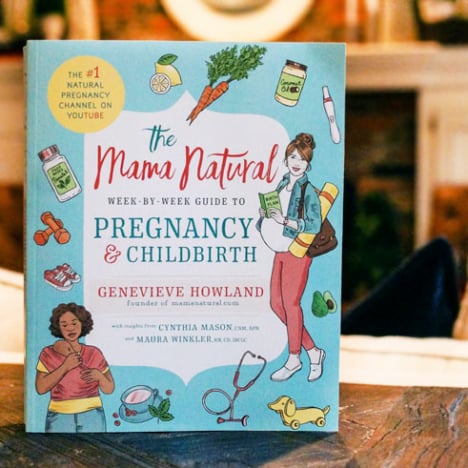
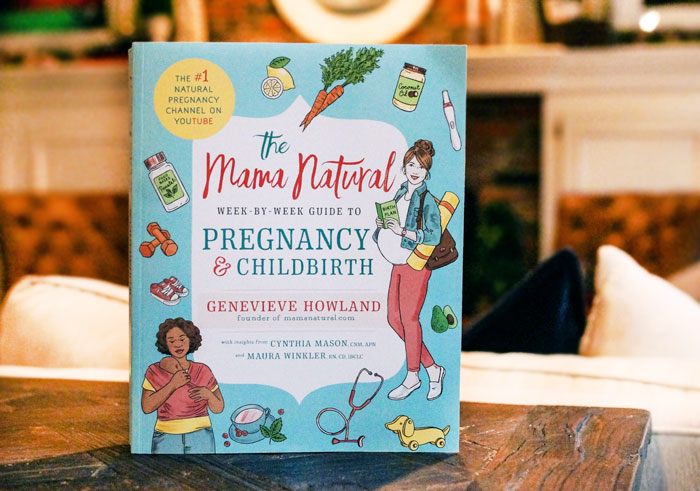

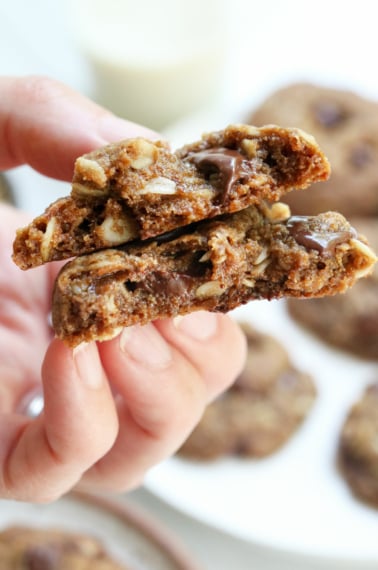

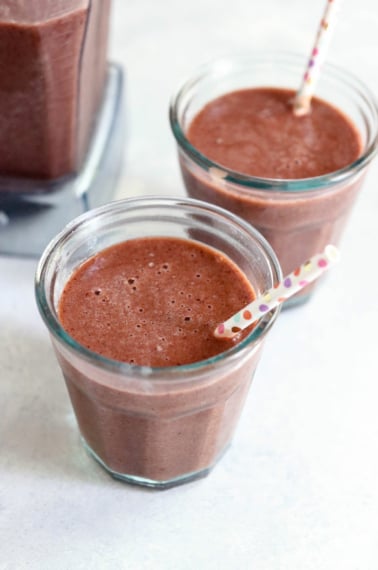
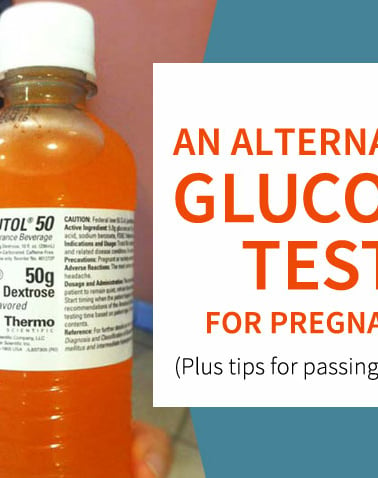






You gave us lots of information about healthy food in pregnancy, Thanks for sharing
Holy smokes this literally took away so many worries and I am promising myself not look any further as I feel this gave me EVERYTHING I need to know. Im ordering the raspberry tea, and will definitely be eating dates as I want this labor to be as easy as possible. Thanks so much for easing my mind with research to back it
Raw papaya should not be consumed during early pregnancy as it can cause a miscarriage
Do you have a link to the research on this?
How come you recommend to est Pineapple and Pappaya to eat while they are the top of the foods to avoid during pregnancy?
Could you please explain?
This post is very helpful. I have been back and forth with being vegetarian the last 6 months, but have been concerned about getting enough nutrients for the baby. I’ll will definitely be using this as a reference. Thank you.
Love this post. Can’t wait to get the book!
I am 15 weeks pregnant and I am really healthy conscious about what to eat. It’s my first pregnancy and I want a healthy pregnancy and baby. Thank you for the information